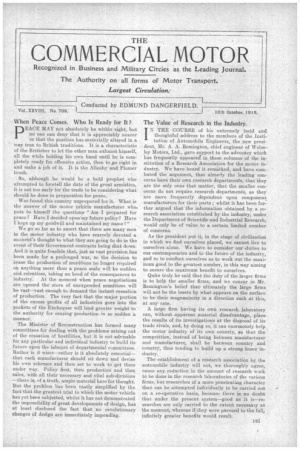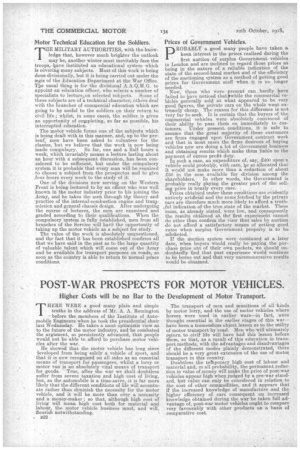When Peace Comes. Who Is Ready for It?
Page 1

Page 2

If you've noticed an error in this article please click here to report it so we can fix it.
pEACE MAY not absolutely be within sight, but no one can deny that it is appreciably nearer or that the position has materially altered in a. way true to British traditions. It is a characteristic of the Britisher to let the other man exhaust himself, all the while holding his own hand until he is completely ready for offensive action, then to so right in and make a job of it. It is the Allenby and Plumer touch.
, So, although he would be a bold prophet who attempted to foretell the date of the great armistice, it is not too early for the trade to be considering what should be done in preparation for peace.
War found this country unprepared for it. What is the answer of the motor vehicle manufacturer whoa puts. to himself the questions, " Am I prepared for peace?. Have I decided uponlmy future policy? Have I kept up my goodwill and maintained my name?"
We go so far as to assert that there are many men in the motor industry who have scarcely devoted a moment's thought to what they are going to do in the event of 'their Government contracts being shut down. And it is quite feasible that, just as vast provision has been made for a prolonged war, so the decision to Cease the production of munitions no longer required on anything more than a peace scale will be sudden and relentless, taking no heed of the consequences to industry-. At the moment when peace negotiations are opened the store of unexpended munitions will be vast—vast enough to demand the instant cessation of production. The very fact that the major portion of the excess profits of all industries goes into the pockets of the Exchequer will lend greater weight to the authority for ceasing production in so sudden a. manner.
The Minister of Reconstruction has formed many committees for dealing with the problems arising out of the cessation of hostilities, but it is not advisable for any particular and individual industry to build its future upon the labours of departmental committees.
Rather is it wiser—rather is it absolutely essential— that each manufacturer should sit down and devise his own schemes and then set to work to get them under way. Policy first, then production and then sales, with all their necessary and vital sub-divisions —there is, of a truth, ample material here for thought. But the problem has been vastly simplified by the fact that the greatest trial to which the motor vehicle has yet been subjected, whilst it has not demonstrated the impossibility of great developments of design, has at least disclosed the fact that 'no revolutionary changes of design are immediately impending.
The Value of Research in the -Industry.
IN THE COURSE of his extremely lucid and thoughtful address to the members of the Institution of Automobile Engineers, the new president, Mr. A. A. Remington, chief engineer of Weiseley Motors, Ltd., gave support to the advocacy which has frequently appearect in these columns of the institution of a Research Association for the motor industry. We have heard it remarked, and have combated the argument, that alreaely the leading concerns have their own research departments, that they are the only ones that matter, that the smaller concerns do not require research departments, as they are more frequently dependent upon component manufacturers for their parts ; whilst it has been further argued that the information obtained by a research association established by the industry, under the Department of Scientific and Industrial Research, would only be of value to a certain limited number of concerns.
As the president put it, in the stage of civilization in which we find ourselves placed, we cannot live to ourselves alone. We have to consider our duties to our contemporaries and to the future of the industry, and so to conduct ourselves as to work out the maximum good to the greatest number, in this way aiming to secure the maximum benefit to ourselves.
Quite truly he said that the duty of the.larger firms is to help the smaller firms, and we concur in Mr. Remington's belief that ultimately the large firms will not be the losers by what appears on the surface to be their magnanimity in a direction such at this, at any rate.
A large firm having its own research laboratory can, without apparent material disadvantage, place the results of its investigation's at the disposal of its trade rivals, and, by doing so, it can enormously help the motor industry of its own country, so that the competition, instead of being between manutacturer and manufacturer., shall be between eountry and country, thus tending to build up a strong home industry.
The establishment of a research association by the automobile industry will not, we thoroughly agree, cause any reduction in the amount of research work to be done in the research laboratories of the various firms, but researches of a more penetrating character than can be attempted individually to be carried out on a co-operative basis, because there is no doubt that under the present system—good as it, is--researches are only carried to the extent necessary at the moment, whereas if they were pursued to the full, infinitely greater benefits would result.
Motor Technical Education for the Soldiers.
TIM MILITARY AUTHORITIES, with the knowledge that, however much brighter the outlook may be another winter must inevitably face the troops, have Instituted an educational system which is covering many subjects. Most of this work is being done divisionally, but it is being carried out under the w.gis of the Education Department at the War Office. The usual thing is for the divisional A.A.Q.M.G. to appoint an education Officer, who selects a number of specialists to lectureAon selected subjects. Some of these subjects are of a technical character, others deal with the branches of commercial education which are going to be useful to the soldiers on their return to civil life ; whilst, in some cases, the soldier is given an opportunity of completing, so far as possible, his interrupted education.
The motor vehicle forms one of the subjects which is being dealt with in this manner, and, up to the prebent, men have been asked to volunteer for the classes, 'but we believe that the work is, now being Made coinpulsery. So far, one and a half hours a week, which invariably means a lecture lasting about an hour with a subsequent discussion, has been considered to be sufficient, but under the compulsory system it is probable that every man will be required to choose a, subject from the prospectus and to give ,four hours every week to the study of it.
One of the divisions now serving on the Western Front is being lectured to by an officer who was well known in the motor industry prior to his joining the Army, and he takes the men through tb,e theory and -practice of the internal-combustion engine and trank mission and general chassis design. After undergoing the course of lectures, the men are examined and graded according to their qualifications. When the compulsory -system is fully established, men from all branches of the Service will havii the opportunity of taking up the motor vehicle as a subject for study.
The value of the work is absolutely unquestioned, and the fact that it has been established confirms all that we'have said in the past as to the large quantity of valuable talent which will come out of the Army and be available for transport purposes on roads, so soon as the country is able to return to normal peace conditions.
Prices of Government Vehicles.
p. ROBABLY a good many people have taken a keen interest in the prices realized during the . first auction of surplus Governmentvehicles in London and are inclined to regard those prices as being in the nature of a relialote indication of the state of the second-hand market and of the efficiency of the auctioning system as a. method of getting good i prices for Government stuff when it s no longer needed. Now, those who were present can hardly have failed to have noticed thatpwhile the commercial vehicles generally sold at what appeared to be very good figures, the private cars on the whole went extremely cheap. The reason for this ,difference is not very far to,seek. It is certain that the buyers of the commercial vehicles were absolutely convinced of their ability to pass them on immediately to customers. Under present. conditions, it is safe to assume that the great majority of these customers are firms engaged upon Government contract work and that in most cases the firms desirous of buying vehicles now are doing a lot of Government business and obtaining results which make them ,liable to the payment of excess profit duty.
In.such a case, an expenditure of, say, ,400 upon a vehicle could probakly, with care, he so allocated that it would not make more than a reduction of about 250 in the sum available for division among the shareholders. In other words, the Government is probably really paying the greater part of ;the sell ing price in nearly every case. .
Prices obtained under these conditions are evidently entirely artificial and the sums fetched by the private cars are therefore much more likely to afford a truth..ful indication 4)f the true state of the market. These sums, as already stated, were low, and consequently the results obtained at thefirst experiniefit cannot do other than confirm the view that sales by auction do not afford a satisfactory -means of getting good rates when surplus Government property is to be marketed.
If the auction system were continued at a, later date, when buyers would really be paying the purchase price out of their own pockets, we should undoubtedly find that past experience would continue to be borne out and that very unremunerative results would be obtained.






















